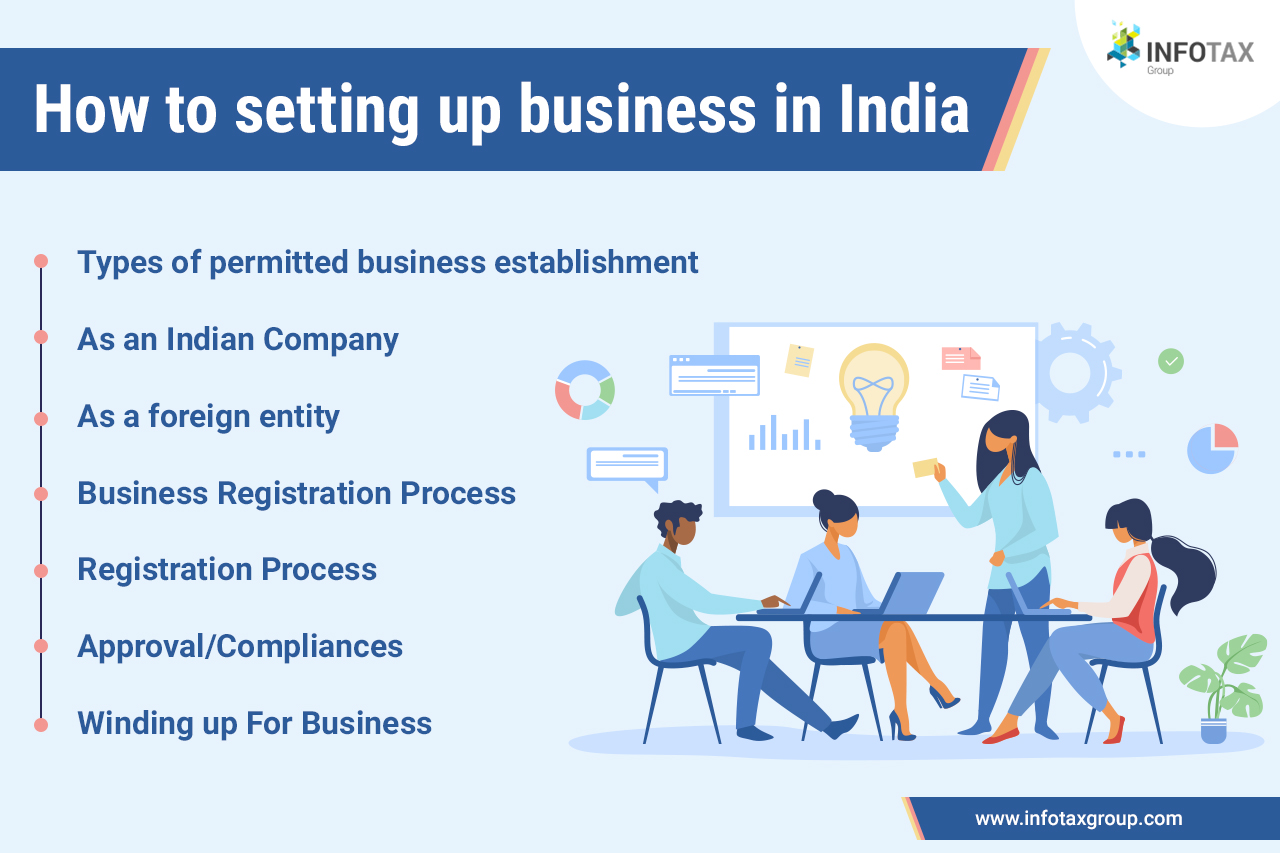Setting up business in India can be a tedious affair if you aren’t well aware about the requisite legal compliances and paperwork. Getting entangled in a legal issue will be the last thing on your mind. While the Ministry of Corporate Affairs has made the process smooth for multinationals however legal experts can help you in setting up business in India while meeting all the compliances accurately.
Types of permitted business establishment
Primarily, you need to decide regarding the type of business establishment. As a foreign company can set up business in the India through different ways below-
As an Indian Company-
- Limited Liability Company- Minimum two directors & shareholders are require to set up as an LLC in India. The registration is completes in 15 days and the company can commence commercial activities on behalf of parent company in India. The LLC is eligible to generate revenue and appoint workforce on the company’s role in India. Also, a net worth of $50,000 or equivalent and profit records of immediately preceding three years in home country is requires for setting up an LLC.
- Limited Liability partnership- LLP is a discreet entity and is the fastest way to set up a foreign office in India. You can start it will minimum two shareholders who can hold upto 99.9% of the company’s shares, appoint employees, borrow funds, and purchase property. They are authorize to take legal actions against any issues. Additionally, the profit track record of immediately preceding 5 financial years in home country and net worth equivalent or more than $ 100,000 is also require for setting up a LLP.
- Joint venture with an Indian company as a partner- JV is one of the most popular way to enter Indian market. It is an alliance of two or more companies who have mutually agreed on investing for a common project or product.
As a foreign entity-
- Liaison Office- It represents the parent company in India and manages complete communication on their behalf. They are not authorize to generate revenue and the operation costs are manage through internal funds. Minimum 45 days are require to complete the registration formality and approval by RBI & MCA.
- Branch Office- A BO is set up to conduct project activities in on behalf of foreign company in India. It can conduct research and commercial activities, provide consultancy support and services offered by parent company in India. Usually the registration is done by RBI & MCA in 45 days.
- Project Office- A project office is usually set up for smooth operations of a particular project and co-fund by international financial institutions in India. It doesn’t need any approval from RBI and just requires project sanction by an Authorized Dealer Bank. It needs to be close after the completion of project.
Business Registration Process
There are few fundamental steps and prerequisites for setting up business in India. The registration process is done by RBI (Reserve Bank of India) and MCA (Ministry of Corporate Affairs) and takes minimum 45 days for the completion.
- Decide unique Company Name- Before commencing the registration process, check the company name availability on MCA website. It should be unique and original. Once approved by MCA, the name will appear on the website.
- Acquire Direct Identification Number (DIN) – It is a special and unique identification number provide to existing or potential company directors and can be easily obtained by filing the DIN-1 Application form online on MCA website. Submit it along with the copy of Passport, Education certificates, proof of current occupation, passport size photograph, and address proof for verification. MCA issues a permanent DIN after the approval of all documents.
- Acquire Digital Signature Certificate (DSC) – An electronic key issued by MCA to validate and identify the holder of DSC & other documents submitted online. To acquire DSC, similar forms and documents are submit for approval.
- Apply for Permanent Account Number (PAN)- To obtain PAN, fill the Form 49A online and send the attested copy of form along with the documents to MCA for approval. PAN card will be deliveres to your registered address by official post.
- Apply for Tax Account Number (TAN)- A special number issued by the Income Tax Department to entities authorized for deduction or collection of tax. Fill the Form 49B and submit along with required documents at NSDL website.
Registration Process-
- Create a new account @mca.gov.in & apply for registration.
- Fill all the required forms online at MCA website and apply for RoC.
- Complete your document list including- , e-Form No. 1 required for company registration, receipts of payment for registration and filing fees, a stamped copy of AoA & MoA, and a copy of letter from the RoC confirming the availability of company’s name
- Opening company’s bank account for commercial transactions.
Approval/Compliances
Submit these documents on MCA website. After approval, take a print of these documents and get them attest by notary. Submit the scanned copy of the notarized document & prescribed fees online. After verification, MCA will issue the Certificate of Incorporation for starting the business operations in India.
Winding up For Business
Under the Section 425 of Companies Act, 1956 there are following modes of winding up-
- Compulsory winding up by the Tribunal
- Voluntary winding up
- Subject to the supervision of the Court
For Voluntary Winding up, the following steps are taken-
- Announce solvency & call for a board meeting
- Take approval of shareholders, creditors & appoint liquidator
- Publish public notice inviting claims
- Repatriate funds, realize assets & discharge liabilities if any
- Submit report on the claim verification by liquidator
- Inform banker & other statutory authorities
- Filing application for winding up
- Post all formalities NCT will give dissolution order
For compulsory winding up or as supervises by the Court, the below steps are required-
- Present a winding up petition to court & the company
- Send a written demand for pending debts to the company
- Court hearing on petition
- Winding up order granted by the Court
- Meeting creditors and other stakeholders, parties etc.
- Appoint Liquidator
- Assign duties for Liquidator
- Realization & distribution of company’s assets to the creditors.
- Finally, Dissolution of the Company
Infotax is a leading online finance & tax consultancy providing online for incorporating business in India. We do end to end management of complete paperwork and legal compliances so that focus on your business and leave the rest on us.







